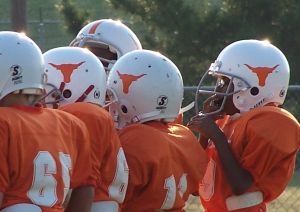SPORTS concussion has long-term, negative, impact on the brain, Geelong research has confirmed.
The Deakin Universitiy study of the brains of 40 retired Australian Rules football players showed they had reduced fine motor control and abnormal changes in brain function compared with healthy people the same age who never played contact sport.
Neuroscientist Dr Alan Pearce’s study was the first to investigate Aussie rules footballers.
“While incidents seem to be on the rise, with an estimated six to seven injuries per team, per season, at all levels of Australian football each year, we have previously been unaware of the long-term effects of repeated sports concussion,” Dr Pearce said.
“With the results of this study now in, it is time that football clubs at the elite and amateur level put in place more robust policies to care for concussed players that include mandatory periods of rest following a concussion.”
Dr Pearce measured the brain activity, mental ability and fine movement dexterity of retired elite and amateur footballers, comparing the results to 20 age-matched healthy people without histories of contact sport.
The elite and amateur footballers averaged 3.8 and 2.4 serious concussions respectively in the 20 years prior.
All study participants undertook tests for fine movement control and reaction time, short-term memory and learning and underwent neurological testing.
Memory and association learning faculties appeared the same but both categories of former footballers performed worse in fine movement control and reaction time tests.
The brain stimulation tests also revealed significant differences in the brain activity of the ex-footballers and healthy controls.
The footballers showed abnormal hyperactivity or loss in excitability in their brain pathways.
The study found the same levels of altered brain function in the elite and amateur players, indicating the standard of play made no difference to the impact of concussion on the brain.
“It is now clear that multiple sports concussions have serious long term impact on the brain,” Dr Pearce said.
“And, in a result that I found surprising, the level of impact is the same regardless of whether the concussions are experienced by elite or amateur players.
“The changes in brain function could see the former players experience difficulties with everyday activities.”
Get the latest news to your email inbox FREE!
REGISTER






